牛津译林版英语八下unit1-unit2
- 格式:docx
- 大小:245.60 KB
- 文档页数:6
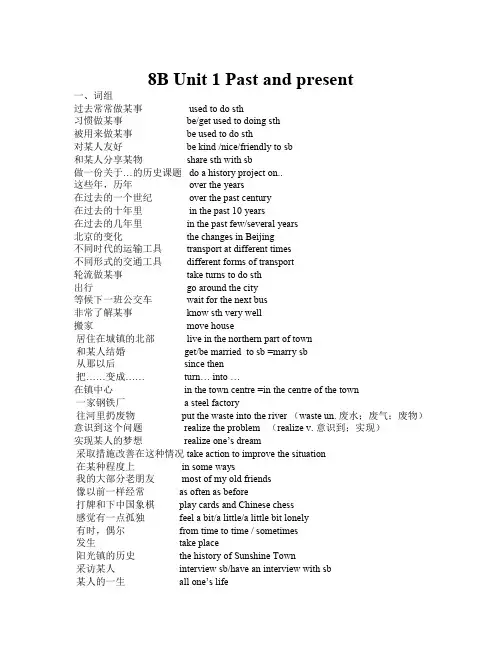
8B Unit 1 Past and present一、词组过去常常做某事 used to do sth习惯做某事 be/get used to doing sth被用来做某事 be used to do sth对某人友好 be kind /nice/friendly to sb和某人分享某物 share sth with sb做一份关于…的历史课题 do a history project on..这些年,历年 over the years在过去的一个世纪 over the past century在过去的十年里 in the past 10 years在过去的几年里 in the past few/several years北京的变化 the changes in Beijing不同时代的运输工具 transport at different times不同形式的交通工具 different forms of transport轮流做某事 take turns to do sth出行 go around the city等候下一班公交车 wait for the next bus非常了解某事 know sth very well搬家 move house居住在城镇的北部 live in the northern part of town和某人结婚 get/be married to sb =marry sb从那以后 since then把……变成…… turn… into …在镇中心 in the town centre =in the centre of the town一家钢铁厂 a steel factory往河里扔废物 put the waste into the river (waste un. 废水;废气;废物)意识到这个问题 realize the problem (realize v. 意识到;实现)实现某人的梦想realize one’s dream采取措施改善在这种情况 take action to improve the situation在某种程度上 in some ways我的大部分老朋友 most of my old friends像以前一样经常 as often as before打牌和下中国象棋 play cards and Chinese chess感觉有一点孤独 feel a bit/a little/a little bit lonely有时,偶尔 from time to time / sometimes发生 take place阳光镇的历史 the history of Sunshine Town采访某人 interview sb/have an interview with sb某人的一生all one’s life在过去 /在现在/在将来 in the past/at present/ in the future教许多关于中国的历史 teach a lot about the history of China学习更多关于北京的过去和现在learn more about Beijing’s past and present听说这部电影 hear about /of the film收到某人的来信 hear from sb计划做某事 plan to do sth居住环境,居住条件 living conditions干净又新鲜的空气 clean and fresh air从……返回 return from / come(go) back from回到…… return to/ come(go) back to出国 go abroad上小学 be at primary school和某人保持联系 keep in touch with sb主要通过电子邮件与某人交流 mainly communicate with sb by email让交流变得容易的多 make communication much easier玩乐的好去处 a good place to have fun穿过城镇的中心 run through the centre of the town很快适应生活的变化 get used to the changes of life quickly独自、独立on one’s own =by oneself=alone在一些大的空地上 in some large open spaces (space cn.空地 un.空间;太空)在两边 on both sides/on each/either side享受舒适的生活 enjoy a comfortable life搬到/搬进/搬出 move to /move into / move out of水/噪音/空气污染 water/noise/air pollution (pollution un.污染;污染物)乘汽车往返城镇 travel to and from the town听收音机 listen to the radio在他们的空余时间 in their free/spare time二、句型1. 后来政府意识到了这个问题并采取措施改善了情况。
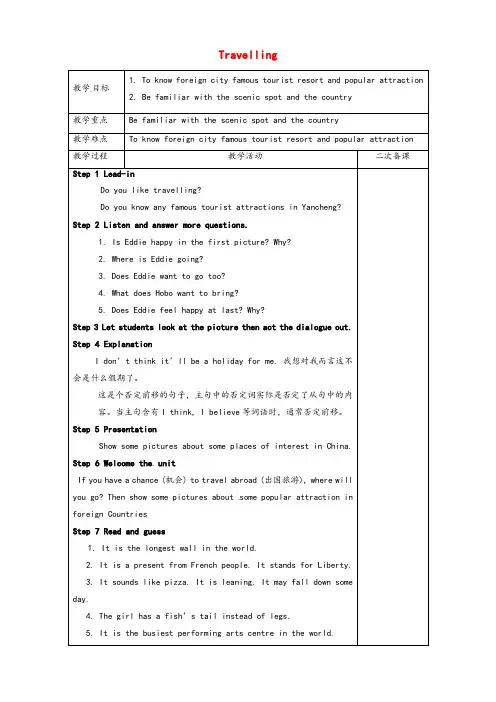
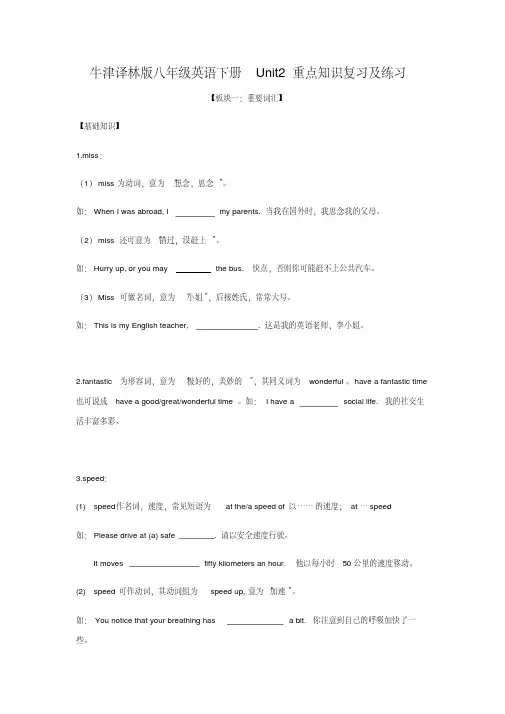
牛津译林版八年级英语下册Unit2重点知识复习及练习【板块一:重要词汇】【基础知识】1.miss:(1)miss为动词,意为“想念,思念”。
如:When I was abroad, I my parents. 当我在国外时,我思念我的父母。
(2)miss 还可意为“错过,没赶上”。
如:Hurry up, or you may the bus. 快点,否则你可能赶不上公共汽车。
(3)Miss 可做名词,意为“小姐”,后接姓氏,常常大写。
如:This is my English teacher, . 这是我的英语老师,李小姐。
2.fantastic 为形容词,意为“极好的,美妙的”,其同义词为wonderful。
have a fantastic time 也可说成have a good/great/wonderful time。
如:I have a social life. 我的社交生活丰富多彩。
3.speed:(1)speed作名词,速度,常见短语为at the/a speed of 以……的速度;at…speed。
如:Please drive at (a) safe . 请以安全速度行驶。
It moves fifty kilometers an hour. 他以每小时50公里的速度移动。
(2)speed 可作动词,其动词组为speed up, 意为“加速”。
如:You notice that your breathing has a bit. 你注意到自己的呼吸加快了一些。
4.through作介词,自始至终,从头到尾;穿过,通过。
如:The river runs our village. 这条河穿过我们的村子。
辨析across和through两者均可表示“横过,穿过”,前者across表示从某物的表面“横过”,而后者则指在里面或在空间范围内“穿过”。
如:I draw a line the page. 我在那一页上面画了一条线。
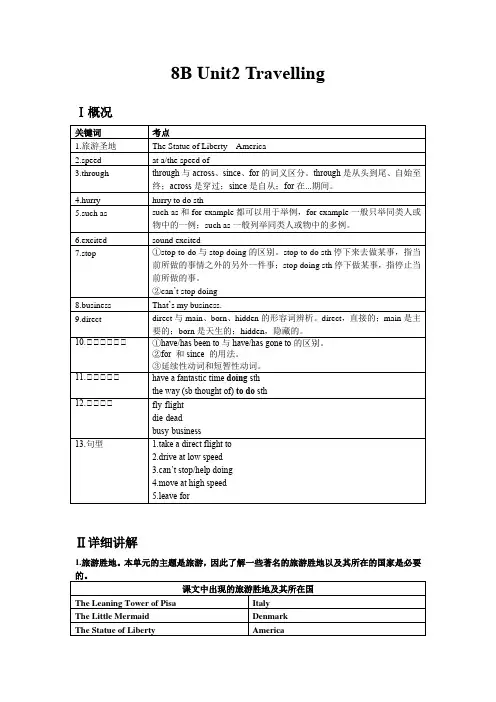
8B Unit2 TravellingⅠ概况Ⅱ详细讲解1.旅游胜地。
本单元的主题是旅游,因此了解一些著名的旅游胜地以及其所在的国家是必要【2020年五中】I will go on a trip to the USA to visit ______ this summer holiday.A. the Sydney Opera HouseB. the Little MermaidC. Tower BridgeD. the Statue of Liberty答案DI miss you so much.21.【2022年树中】—Is anything worth seeing in Nanjing?—Yes. Don’t __________ Zhongshan Mountain National Park with lots of cultural relics and natural beauty.A.forgetB. missC. avoidD. prevent答案BWe’re having a fantastic time here.【2022年十二】10. great fun it is to fly kites! fantastic time the children are having!A. What; What aB. What; WhatC. How; How aD. What a; What【答案】A2.It moved at high speed and was really exciting.(1)speed的基本含义作名词,意思是速度(2)speed的核心考点,考察speed的固定搭配at a/the speed of,以...样的速度,介词用at,speed前用冠词。
而搭配at high speed中没有冠词。
2. The train is running the speed of 200 kilometers per hour.A. withB. atC. inD. for答案B3.We were screaming and laughing through the ride.(1)through的基本含义作介词,意思是从头到尾,自始至终(2)through的核心考点考察through与across、since、for的词义区分。
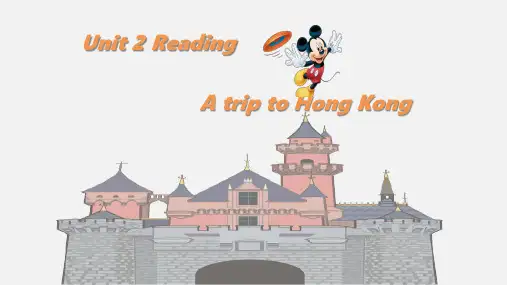
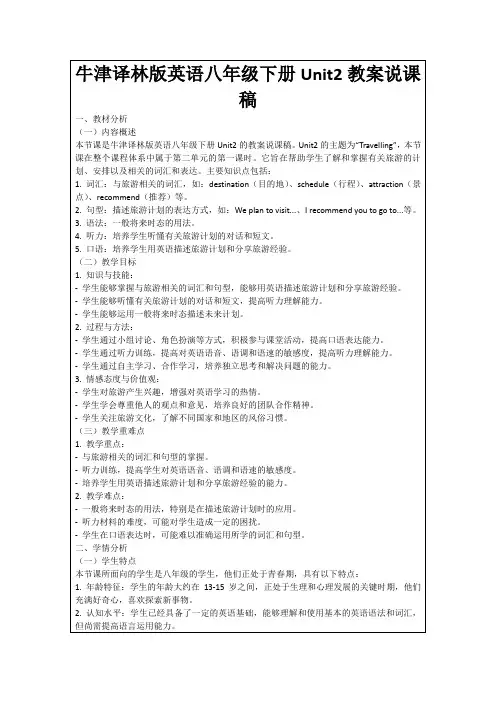
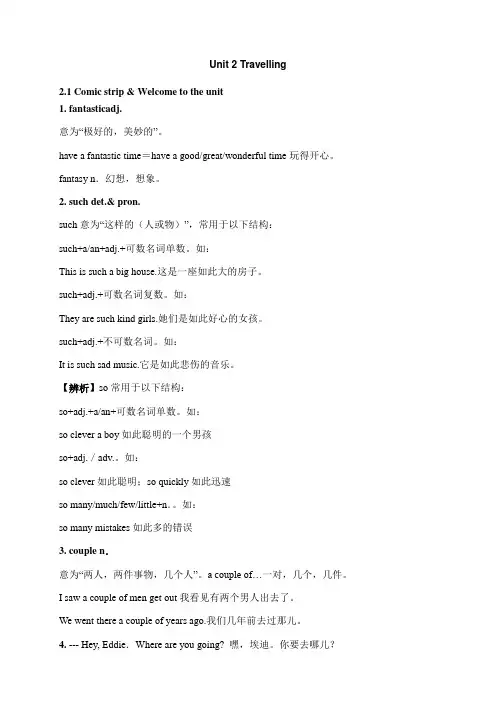
Unit 2 Travelling2.1 Comic strip & Welcome to the unit1. fantasticadj.意为“极好的,美妙的”。
have a fantastic time=have a good/great/wonderful time玩得开心。
fantasy n.幻想,想象。
2. such det.& pron.such意为“这样的(人或物)”,常用于以下结构:such+a/an+adj.+可数名词单数。
如:This is such a big house.这是一座如此大的房子。
such+adj.+可数名词复数。
如:They are such kind girls.她们是如此好心的女孩。
such+adj.+不可数名词。
如:It is such sad music.它是如此悲伤的音乐。
【辨析】so常用于以下结构:so+adj.+a/an+可数名词单数。
如:so clever a boy如此聪明的一个男孩so+adj./adv.。
如:so clever如此聪明;so quickly如此迅速so many/much/few/little+n.。
如:so many mistakes如此多的错误3. couple n.意为“两人,两件事物,几个人”。
a couple of…一对,几个,几件。
I saw a couple of men get out我看见有两个男人出去了。
We went there a couple of years ago.我们几年前去过那儿。
4. --- Hey, Eddie.Where are you going? 嘿,埃迪。
你要去哪儿?---I'm going to South Hill for my holiday.我要去南山度假。
这两句都表示将要做某事,一般用将来时态,但因为句中的动词是go,所以可用现在进行时表示将来的概念。
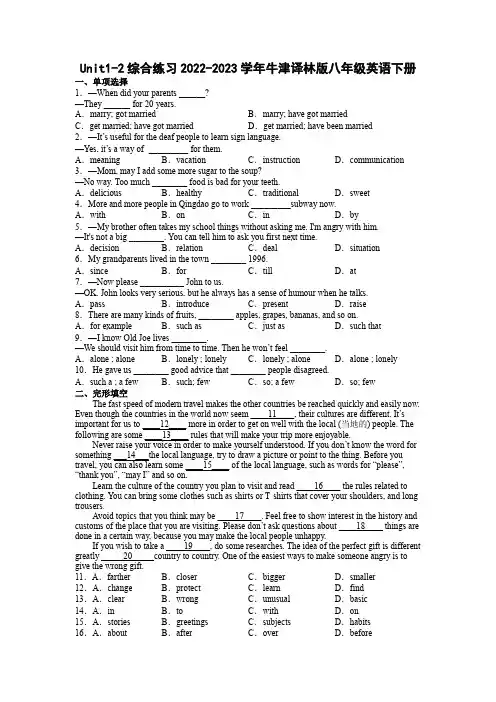
Unit1-2综合练习2022-2023学年牛津译林版八年级英语下册一、单项选择1.—When did your parents ______?—They ______ for 20 years.A.marry; got married B.marry; have got marriedC.get married; have got married D.get married; have been married2.—It’s useful for the deaf people to learn sign language.—Yes, it’s a way of_________ for them.A.meaning B.vacation C.instruction D.communication 3.—Mom, may I add some more sugar to the soup?—No way. Too much ________ food is bad for your teeth.A.delicious B.healthy C.traditional D.sweet4.More and more people in Qingdao go to work _________subway now.A.with B.on C.in D.by5.—My brother often takes my school things without asking me. I'm angry with him.—It's not a big ________. You can tell him to ask you first next time.A.decision B.relation C.deal D.situation6.My grandparents lived in the town ________ 1996.A.since B.for C.till D.at7.—Now please __________ John to us.—OK. John looks very serious, but he always has a sense of humour when he talks.A.pass B.introduce C.present D.raise8.There are many kinds of fruits, ________ apples, grapes, bananas, and so on.A.for example B.such as C.just as D.such that9.—I know Old Joe lives ________.—We should visit him from time to time. Then he won’t feel ________.A.alone ; alone B.lonely ; lonely C.lonely ; alone D.alone ; lonely 10.He gave us ________ good advice that ________ people disagreed.A.such a ; a few B.such; few C.so; a few D.so; few二、完形填空The fast speed of modern travel makes the other countries be reached quickly and easily now. Even though the countries in the world now seem ____11____, their cultures are different. It’s important for us to ____12____ more in order to get on well with the local (当地的) people. The following are some ____13____ rules that will make your trip more enjoyable.Never raise your voice in order to make yourself understood. If you don’t know the word for something ___14___the local language, try to draw a picture or point to the thing. Before you travel, you can also learn some ____15____ of the local language, such as words for “please”, “thank you”, “may I” and so on.Learn the culture of the country you plan to visit and read ____16____ the rules related to clothing. You can bring some clothes such as shirts or T-shirts that cover your shoulders, and long trousers.Avoid topics that you think may be ____17____. Feel free to show interest in the history and customs of the place that you are visiting. Please don’t ask questions about ____18____ things are done in a certain way, because you may make the local people unhappy.If you wish to take a ____19____, do some researches. The idea of the perfect gift is different greatly _____20_____country to country. One of the easiest ways to make someone angry is to give the wrong gift.11.A.farther B.closer C.bigger D.smaller 12.A.change B.protect C.learn D.find 13.A.clear B.wrong C.unusual D.basic14.A.in B.to C.with D.on 15.A.stories B.greetings C.subjects D.habits 16.A.about B.after C.over D.before17.A.modern B.honest C.polite D.personal 18.A.which B.what C.why D.where19.A.gift B.box C.camera D.clock20.A.up B.by C.between D.from三、阅读单选AI’m Rory Blake. My family is travelling in London now. And I live on a houseboat (游艇) with my family. Now the boat is staying on the River Thames. We use it to travel and at the same time, it is our “hotel”.People may think that houseboats are simple, but we have everything—two bedrooms, a living room and a kitchen. There’s even a “garden” on the roof of the boat. We grow many vegetables up there.Our houseboat is usually in the center of London. It’s a cool place to keep the boat—we’re near some famous museums and a good library, and the view is amazing.The only problem is the ________. When it’s windy, the boat goes up and down! Also, the boat needs painting every year. In fact, my dad and his friend are painting it now.When visitors come here, they walk into our living room first. It’s a bright room as the sun can shine in through the window. You can find a big TV, a sofa, two beautiful paintings and many other things in it.The kitchen is my favorite room. My mom is making dinner there now. We’re going to eat in our “garden”, on the roof!根据材料内容,选择最佳答案。
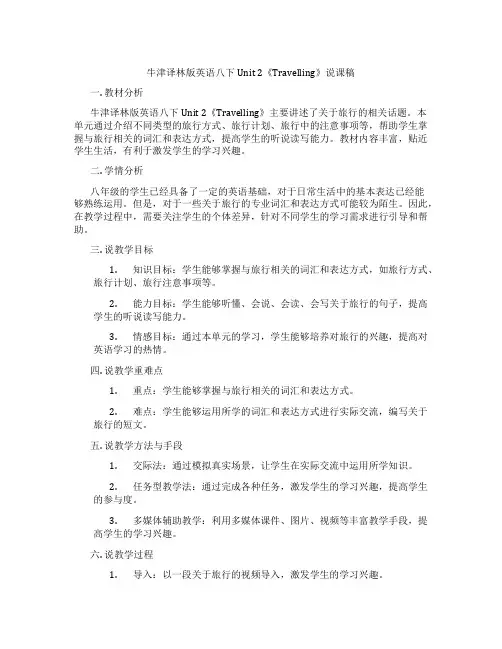
牛津译林版英语八下Unit 2《Travelling》说课稿一. 教材分析牛津译林版英语八下Unit 2《Travelling》主要讲述了关于旅行的相关话题。
本单元通过介绍不同类型的旅行方式、旅行计划、旅行中的注意事项等,帮助学生掌握与旅行相关的词汇和表达方式,提高学生的听说读写能力。
教材内容丰富,贴近学生生活,有利于激发学生的学习兴趣。
二. 学情分析八年级的学生已经具备了一定的英语基础,对于日常生活中的基本表达已经能够熟练运用。
但是,对于一些关于旅行的专业词汇和表达方式可能较为陌生。
因此,在教学过程中,需要关注学生的个体差异,针对不同学生的学习需求进行引导和帮助。
三. 说教学目标1.知识目标:学生能够掌握与旅行相关的词汇和表达方式,如旅行方式、旅行计划、旅行注意事项等。
2.能力目标:学生能够听懂、会说、会读、会写关于旅行的句子,提高学生的听说读写能力。
3.情感目标:通过本单元的学习,学生能够培养对旅行的兴趣,提高对英语学习的热情。
四. 说教学重难点1.重点:学生能够掌握与旅行相关的词汇和表达方式。
2.难点:学生能够运用所学的词汇和表达方式进行实际交流,编写关于旅行的短文。
五. 说教学方法与手段1.交际法:通过模拟真实场景,让学生在实际交流中运用所学知识。
2.任务型教学法:通过完成各种任务,激发学生的学习兴趣,提高学生的参与度。
3.多媒体辅助教学:利用多媒体课件、图片、视频等丰富教学手段,提高学生的学习兴趣。
六. 说教学过程1.导入:以一段关于旅行的视频导入,激发学生的学习兴趣。
2.新课呈现:通过展示图片、实物等,引入本节课的主题,引导学生学习相关词汇和表达方式。
3.课堂练习:设计不同类型的练习,让学生在实际交流中运用所学知识。
4.小组活动:学生分组进行讨论,分享各自的旅行经历,促进学生之间的交流。
5.课堂小结:对本节课所学内容进行总结,帮助学生巩固记忆。
6.课后作业:布置相关任务,让学生课后进行练习,巩固所学知识。
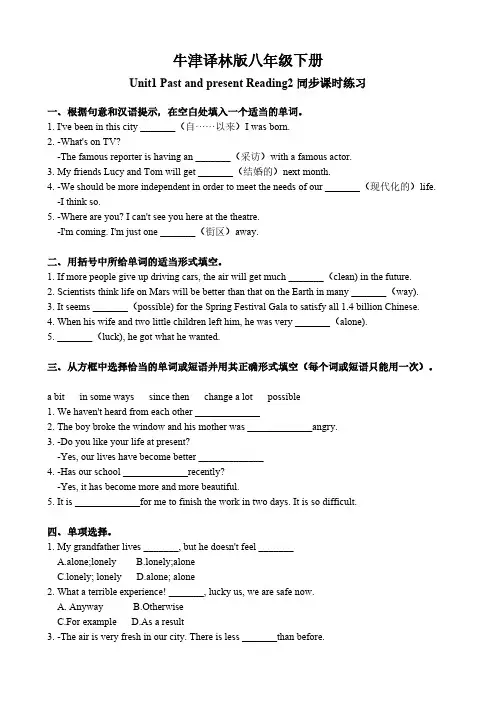
牛津译林版八年级下册Unit1 Past and present Reading2同步课时练习一、根据句意和汉语提示,在空白处填入一个适当的单词。
1. I've been in this city _______(自······以来)I was born.2. -What's on TV?-The famous reporter is having an _______(采访)with a famous actor.3. My friends Lucy and Tom will get _______(结婚的)next month.4. -We should be more independent in order to meet the needs of our _______(现代化的)life. -I think so.5. -Where are you? I can't see you here at the theatre.-I'm coming. I'm just one _______(街区)away.二、用括号中所给单词的适当形式填空。
1. If more people give up driving cars, the air will get much _______(clean) in the future.2. Scientists think life on Mars will be better than that on the Earth in many _______(way).3. It seems _______(possible) for the Spring Festival Gala to satisfy all 1.4 billion Chinese.4. When his wife and two little children left him, he was very _______(alone).5. _______(luck), he got what he wanted.三、从方框中选择恰当的单词或短语并用其正确形式填空(每个词或短语只能用一次)。
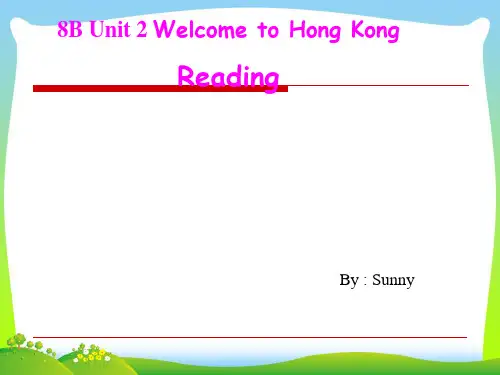
江苏专版牛津译林八年级下册U n i t-2-知识点复习总结work Information Technology Company.2020YEAR江苏专版译林八下U2知识点总结1.Can I join you? 我能加入你吗?解析:join, 动词,意为“加入;参加”,表示加入某一组织、党派、社会团体或某一人群中,成为其成员。
join后常跟club, army, team, group等或表示人称代词宾格的单词。
如: He is too young to join the army.他太年轻了,还不能参军。
We are having supper now. Would you like to join us?我们正在吃晚饭。
你想加入我们吗?如: She joined the Young Pioneers.她加入了少先队。
Come and join in the ball game, Jack.杰克,来参加球赛。
We'll take part in social practice during the summer vacation.暑假期间我们将参加社会实践。
注意:take part in是固定短语,part前一般不用冠词,但part前若有形容词修饰时,要用不定冠词。
如: Lincoln took an active part in politics and was strongly against slavery.林肯积极参加政治活动,强烈反对奴隶制度。
2.I don't think it'll be a holiday for me.我想对我而言这不会是什么假期了。
解析:此句是一个含有宾语从句的主从复合句,I don't think是主句,it'll be a holiday for me是宾语从句。
在“I/We think +宾语从句”的结构中,如果后面的宾语从句是否定句,否定词要前移到主句中,即主句的谓语动词用否定式,而从句的谓语动词用肯定式,结构为“I/Wedon't think十宾语从句”。
Unit 1 Past and present教案总课题8B Unit 1 Past and present 总课时8 第1 课时课题Welcome to the unit 课型New教学目标1 To introduce the present perfect tense generally.2 To introduce the different forms of transport at different times in Hong Kong.教学重难点1.To introduce the present perfect tense generally.2 To introduce the different forms of transport at different times in Hong Kong.学法指导task-centered approach教具准备课件教学步骤二次备课Step 1: Free talkIn the past, Hobo and Eddie weregood friends. But now somethinghappens between them. Do you wantto know what’s wrong with them?Step 2: PresentationRead the dialogue, and find out the answers to the followingquestions.1)What was in the bowl an hour ago?2) What did Eddie do?3) Why did he do that thing?4) Why does Hobo think Eddie has changed?Explaining the new tense :the present perfect tenseEg: 1) Have you seen my food?(see—saw—seen)2)I’ve (I have) eaten it.(eat—ate—eaten)3) We have not seen him for a long time ……4) How has he changed?Let Ss read the dialogue in pairs.Step 3: Presentation1. Show the pictures . Discuss them with the Ss.: What’s the use ofit?Where do you usually see it?Is it a special one? Why?Which transport do you like best?2. Write the correct names under the pictures.Step 4: PracticeFinish part B (Back to the past) & complete the timeline.作业设计1.背诵本课的单词与词组2.预习Reading,完成预习作业教学反思总课题8B Unit 1 Past and present 总课时8 第2课时课题Reading 1 课型New 教学目标1 To grasp some useful expressions2 To infer general meaning from title and context教学重难点The unders tanding of the reading学法指导Task-centered approach教具准备课件教学步骤二次备课Step 1 Free talk .Where is your hometown?Has it changed a lot?Can you tell us something about the changes to your hometown?As you know, I am a teacher now. But five years ago, I was ateacher, too. So I have worked here for 3 years. I think our schoolchanged a lot. Do you think so? Everything has changed a lot?Step2: Presentation.Have you been to Beijing? Now, look at some pictures of it. Witnessgreat changes to it over 100 years. Show pictures.Step 3 Reading A1. Would you like to listen to Mr Chen, Daniel’s grandpa? Play theta pe for Ss 2 times. Answer the following questions.How long has Mr Chen known Sunshine Town?Did Mr Chen live there all the time? Why?Does Mr Chen think the place changed a lot?What are the differences between the past and present?2.Check the answers if they can not answer.3. Explain some difficul t points.4. Ask Ss to read in pairs and try to act it out.Step4: Practice.1.Do the exercise on page 10 B1Match the words on the left with the meanings on the right.2. Finish off the exercises of partB2,3 on P.(T/F).S tep 5 Finish Part D on page 11作业设计1.背诵本课的单词与词组2.完成《课课练》上本课时的作业教学反思总课题8B Unit 1 Past and present总课时8 第 3 课时课题Reading 2课型New教学目标To grasp some useful expressions and understand the new tense-Present perfect tense;To retell the main idea of the text;教学重难点To get more detailed information about the changes to the town and understand the new tense-Present perfect tense.学法指导Task-centered approach教具准备课件教学步骤二次备课Step 1: Pre-checking.Translate the phrasesAsk some students to give us the answers and then correct;Ask themto read together.B.预习交流作业(见学案)小组核对-----集体校对-----质疑交流C.Further understanding the text.Ask and answer.Who is Mr Chen?(He is Daniel's grandpa who lived in Sunshine Town before.)What do you know about Mr Chen?(He got married in 1965.Then he and his wife moved to another flat inthe center of town. Lase Last year, they moved again. Now, he oftenmeets his friends in the park.He feels a bit lonely from time to time.)What was in Sunshine Town in the past?(There was some small restaurants,shops and market stalls. There wasalso a small post office and an old cinema.)How many people lived there in the past?(30,000people.)What is the town centre now?(It's a park. )What does Mr Chen do in the park?(He meets his friends to play cardsand chinese Chinese chess.)Why is there less water pollution than before?(Because thegovernment has took taken action to reduce the pollution. )Step2:PresentationA. Present perfect tense:①概念:动词结构:have/has+动词的过去分词基本用法:表示这个动作发生在不确定的过去时间并对现在有影响。
Unit2语法,知识点,写作背默语法精讲现在完成时(二)1.have/has gone to和have/has been to的用法。
(1)have/has gone to意为“到某地去”,说话时该人不在现场,一般不用第一、二人称作句子的主语。
例如:—Where is Jim?吉姆在哪里?—He England.他去英国了。
(尚未回来)(2)have/has been to意为“曾经去过某地”,现在已不在那里了,后可接次数,如once,twice,three times等,表示“去过某地几次”,也可和just,never,ever等连用。
例如:My father Beijing twice.我父亲去过北京两次。
此外,have/has been in表示“在某地待了多长时间”,常与表示时间段的状语连用。
例如:I Shanghai for three years.我到上海已有三年了。
2.延续性动词和非延续性动词。
动词按动作发生过程的长短, 分为延续性动词和非延续性动词1. 延续性动词的用法:延续性动词表示的动词是一种可以延续一段时间的动作。
如:learn, work, stand, know, walk, keep, have, wait, watch, sing, read, sleep, live 等。
这一类动词常与表示一段时间的时间词连用。
e.g. 我学习英语已经8 年了。
I English for eight years.2. 非延续性动词的用法非延续性动词表示的动作不能延续, 即动作发生立即结束。
如:leave, start, set out, arrive, reach, get to, begin, stop, shut, turn off, marry, put, put on, get up, wake, fall, join, finish, end, become, come, go, die, close, open, break, give, jump, buy, borrow 等。
⽜津译林版⼋年级英语全册语法知识点总结8A语法Unit 1 Friends形容词⽐较级和最⾼级的变化规则1.规则变化:(1)⼀般形容词+er +est (shorter, smaller, smallest )(2)以e 结尾的形容词+r +st (nicer, larger, largest)(3)以辅⾳字母加y 结尾的形容词变y 为i 再+er, est (busier, busiest; heavier, heaviest)(4)以重读闭⾳节结尾的形容词双写辅⾳字母+er, est 熟记:⼤(big)热(hot)天,⼀个穿红(red)⾐浑⾝湿(wet)透的伤感(sad)胖(fat)⼦想要变得⼜瘦(thin)⼜苗条(slim)2.不规则变化(1)good(well)-better-best(2) many(much)-more-most(3)ill(bad, badly)-worse-worst(4) far-farther (further)-farthest (furthest)(5) little-less-least(6) few-fewer-fewest3.多⾳节的形容词⽐较级和最⾼级在词前加more , mostdelicious-more delicious-the most delicious popular-more popular-the most popular注意: 1 形容词的最⾼级前必须有the, ⽽副词的最⾼级前the 可省略2.⽐较级前常⽤a bit, a little, much, a lot, even, far 等词表⽰程度.3.形容词⽐较级⽤来⽐较两者(⼈或事)句中常有than; 形容词最⾼级⽤来⽐较三者或三者以上(⼈或事), 句中常有in 或of 短语表⽰⽐较范围.4. as+adj.+as (和------⼀样------) / not as/so +adj.+ as (不如------,不及------)Unit 2 School life⼀、⽐较事物的数量1.many (修饰可数名词)/much (修饰不可数名词)----more ----mostmore + 可数名词复数/ 不可数名词+ than ……⽐……数量多e.g. I have more friends than you.2.few (修饰可数名词) ----fewer----fewestlittle (修饰不可数名词)----less----leastfewer +可数名词复数+ than ……⽐……数量少e.g. There are fewer boys than girls in our class.less + 不可数名词+than ……⽐……数量少e.g. I spend less money on food than my sister.3.the fewest +可数名词复数在……中最少He has the fewest books.4.the least +不可数名词在……中最少She has the least money of us.5.the most + 可数名词复数/ 不可数名词最多Daniel has the most money.⼆、副词的⽐较级和最⾼级(构成⽅法及⽤法与形容词基本相同)1.⼀般在词尾直接加er或est,例如,hard-harder-hardest fast-faster-fastest loud-louder-loudest2、部分双⾳节词和多⾳节词分别在原级前加more构成⽐较级和most构成最⾼级,例如:slowly-more slowly-most slowly clearly-more clearly-most clearlycarefully-more carefully-most carefully3、副词⽐较级和最⾼级的不规则变化well-better-best badly-worse-worstfar-farther/further-farthest/furthestUnit 3 A day out⼀、as…as的⽤法表⽰A与B在某⼀⽅⾯程度相同或不同时⽤形容词/副词原级。
Unit 2 Travelling词汇部分:1. go on a trip. 相当于have a trip.He is going on a trip to Beijing. 他准备去旅行。
He is having a trip to Beijing.2. fun 用名词表示“享乐”、“娱乐”、“乐趣”,有趣的人或事、开心的事,fun是不可数名词,因此,其前不可以加不定冠词 aIt’s fun to play with water. 玩水是件有趣的事。
Let’s go this way. It’s going to be more fun. 咱们走这边,会更有趣。
We have a lot of fun at the party. 晚会上我们玩得很开心。
3. take sb out 带某人出去take sb to the park. 带某人去公园4. excited/ exciting. 都是形容词,其中excited 通常修饰人、描述人的感受。
exciting 通常描述事物(或消息)的特征。
例如:The film is very exciting. 电影很令人激动。
We are excited at the news. 我们对这些消息感到很激动。
英语中像这样的形容词很多,如:surprised interested movedsurprising interesting moving5. go hiking/ go skiing 去徒步旅行/ 去滑水。
go skating 去滑冰go swimming 去游泳go shopping 去购物6. as soon as 一……就……I went shopping as soon as I arrived . 我一到就去购物。
You will see the beautiful view as soon as you get there. 你一到那儿就会看见美丽的风景。
初中英语学习材料madeofjingetieji8Bunit1-Unit2测试A. 听对话回答问题。
(听两遍)(10分)( )1. Where will the man go during Christmas?A.B.C.( )2. Where does the Girl’s father work?A. B. C. ( )3. Who waved to the woman in the parade?A.B.C.( )4. What’s the man’s favorite activity?A.B.C.( )5. What are the two speakers going to do?A. Draw pictures.B. Learn to dance.C. Take photos. ( )6. Who will the girl go to watch fireworks with?A. Her classmates.B. Her cousins.C. Her parents. ( )7. What does the man sometimes do on Sundays?A. Read books.B. Listen to music.C. Go shopping. ( )8. What is Jerry’s hometown famous for?A. Tea.B. Sight.C. Food.( )9. What does the man like to do in China?A. Learn Chinese language.B. Visit Chinese gardens.C. Eat Chinese food.( )10. How do the two speakers like to travel?A. By train.B. By bicycle.C. By plane.B. 听下面几段对话,选择正确答案。
听两遍。
听下面一段材料,回答第11-12题。
( )11. What’s on the wall?A. a yellow cat.B. a yellow kite.C. a grey kite.( )12. Whose is it?A. It’s Nick’s.B. It’s the woman’s.C. It’s the man’s.听一篇短文,回答第13-15小题。
请根据内容从A、B、C三个选项中选择正确的选项,完成信息记录表。
听两遍。
How to learn a language wellWhat’s the writer’s opinion of learning a language?13What should you do when people laugh at your mistakes? We should 14We should 15 when we make a mistake.( )13. A. Writing B. Using it C. Listening( )14. A. be sad B. not be sad C. get angry( )15. A. keep quiet B. feel worried C. keep the sense of humorC.听短文,选择正确答案。
听两遍。
( )16. How many mealsdo many English people have a day?A. Two.B. Three.C. Four.( )17. What may people have for their breakfast?A. Tea or eggs.B. Porridge, eggs or bread, tea or coffee.C. Tea and coffee.( )18. When do English people have lunch?A. Any time.B. One.C. Five.( )19. What don’t people eat for their dinner?A. Porridge.B. Bananas and apples.C. Meat and fish.( )20. When do some of the English people have dinner?A. At one clock.B. In the middle of the day.C. In the evening.二、单项选择1. ---Where is Mr. Wang?---He together with his students _______________Zhuyuwan Park.A. has gone toB. have gone toC.have been toD. has been to2. ---Have you ever traveled abroad?---Sure. I in a small town in the USA with my grandparents.A. used to liveB. was used to livingC. was used to liveD. didn’t use to live3. --- I hear Sam has gone to Qingdao for his holiday.--- Oh, how nice! Do you know when he ?A. leftB. was leavingC. has leftD. had left4. --- Did you have a good time at Linda’s birthday party?--- Yes. It’s several years ________ I enjoyed myself so much.A. whenB. beforeC. sinceD. that5. ---He’s never been late for school,__________ he ?---________, he always arrives at school on time.A. is; YesB. has; NoC. has; YesD. hasn’t; No6. Is _______ air pollution ________ serious problem now?A. a, aB. /, aC. the, theD. the, /7. — When did your parents __________?— They ___________ for 20 years.A. marry; got marriedB. get married; have got marriedC. marry; have got marriedD. get married; have been married8. A couple of years ________ since the earthquake took place in Wenchuan.A. passedB. has pastC. have passedD. has passed9. People in Jiangyan __________ walk or ride bikes, but now they__________ taking the bus ordriving cars.A. used to; are used toB. were used to; used toC. were used to; are used toD. used to; used to10. — The beef in this restaurant tastes nice.—You can’t find better beef in any other restaurant.A. Why?B. I can’t agree.C. Are you sure?D. Exactly.11. —We _______ keep quiet in the library.—Yes, I agree with you. And we _________ bring our student cards every time.A. must; mustn’tB. have to; mustn’tC. must; don’t have toD. have to; don’t have to12. The Johnsons are planning to go to Australia __________ holiday, but they haven’t decided whichcity to go to _________ their holiday.A. for; forB. on; onC. for; onD. on; for13. — What do you think of the TV show Running Man?— Wonderful! I think it is ______ an interesting TV show that______ many people like watching it.A. so; soB. such; soC. so; suchD. such; such14. Look! What a clean room! Who _______ it?A. is cleaningB. cleanedC. has cleanedD. cleans15. A number of foreign visitors _____ Chengdu many times because it is such a beautiful city.A. have been toB. has been toC. has gone toD. have gone to16. —Don't talk in the library. Always keep quiet here. —_________.A. I see.B. Yes, I am.C. I can.D. I do.17. Bad luck! We missed the early bus. , it kept raining the whole morning.A. HoweverB. In factC. MoreoverD. Otherwise18. — Your bag looks heavy. Do you need a hand?—. Thanks all the same.A. I can manage itB. Yes, pleaseC. It’s really kind of youD. My pleasure19.The shop _____________ since two years ago.A. is openB. has been openedC. has been openD. has open20. She has been ________ Jim for ten years.A. married withB. got married toC. married toD. marriage with21.The life we were used to ________greatly since 1992.A. changeB. has changedC. changingD. have changed22.--This is no-smoking zone. Can’t you see the sign? ---Oh , sorry. I ______ it.A. haven’t seenB. didn’t seeC. don’t seeD. won’t see二、据句意和汉语注释,写出单词的正确形式。